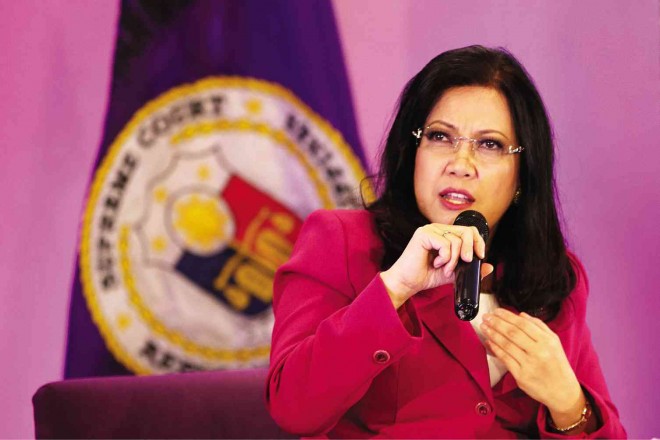Regarded as the passive yet most powerful of the government’s three branches, the judiciary has seen days of disquiet during President Rodrigo Duterte’s first 12 months in office.
Riding on the popularity that sealed his historic win in the May 2016 elections, Mr. Duterte had no qualms about speaking his mind on the stringent reforms he wanted to pursue, such as employing punitive actions in stemming the country’s narcotics problem.
His take-no-prisoners approach in curbing the illegal drug trade came banging even on the doors of the “gods of Padre Faura,” as the 15-member Supreme Court granted protective orders to the kin of two slain drug personalities.
In no time, the judiciary found itself in the crosshairs of the President’s brutal drug war after he accused in a nationally televised speech in Davao City on Aug. 7, 2016, seven lower court judges of cavorting with the drug lords.
Critics claimed the accusation set off Mr. Duterte’s attempt to emasculate the judiciary, which had the power to strike down as unconstitutional any of his orders.
“I ordered the validation. I am the one reading it and I am the sole person responsible for this one,” Mr. Duterte said as he identified the judges, policemen, politicians and other government officials in his “narcolist.”
Potential crisis
This prompted Chief Justice Maria Lourdes Sereno to write a letter to the President reminding him that the high court was the “sole entity” tasked to penalize erring judges.
“A premature announcement of an informal investigation on allegations of involvement with the drug trade will have the unwarranted effect of rendering the judge veritably useless,” Sereno said.
She said she would strongly advise the judges named not to surrender.
The President warned the Chief Justice not to “create a crisis because I will order everybody in the executive department not to honor you.”
“Please, don’t order me. I’m not a fool. If this continues, [with] you trying to stop me, I might lose my cool. Or would you rather I declare martial law?” he warned.
In several speeches, the President, a state prosecutor before he was elected mayor of Davao City, admitted that he had flouted the law to carry out what he needed to do.
He said he once “planted evidence” to help authorities bust gang members and that he himself killed criminals when he was a mayor.
Mr. Duterte, who earned the moniker “The Punisher” for promoting vigilantism to zap criminality, had also openly ordered the police and the military to kill drug suspects if they resisted arrest.
Local and international human rights advocates questioned his shoot-to-kill orders, claiming this spurred the unabated murders of drug personalities.
Shock and awe
Despite the spat with Sereno, the President has so far hurdled two of the major court challenges — his orders to bury the late tyrant Ferdinand Marcos at Libingan ng mga Bayani and to place the entire Mindanao under martial law following the May 23 attack of the Islamic State-inspired Maute terror group in Marawi City.
Former Solicitor General Florin Hilbay said Mr. Duterte’s rather abrasive treatment of the judiciary could be part of “a shock and awe strategy.”
“I hope the court shows more signs of pushback, lest it ends up validating policies that undermine constitutionalism and the rule of law,” he said.
But Chief Presidential Legal Counsel Salvador Panelo says the President remains respectful of judicial processes.
“There’s no problem. Each branch respects each other. The relationship is cordial,” Panelo said.
“The President is a lawyer. All lawyers are trained to respect the rule of law and the Constitution,” he added.
The President is set to name at least 12 more justices of the Supreme Court before his six-year term ends in 2022, but Panelo said he expected Mr. Duterte would keep his hands off the affairs of the high tribunal.
“As a lawyer, he knows that there is such a thing as separation of powers and even if he attempts to emasculate the judiciary, he knows that he will not succeed,” said Pacifico Agabin, former law dean of the University of the Philippines.
“We cannot really presume that the next set of appointees would be following his instructions or would be subservient to the President,” Agabin added.
